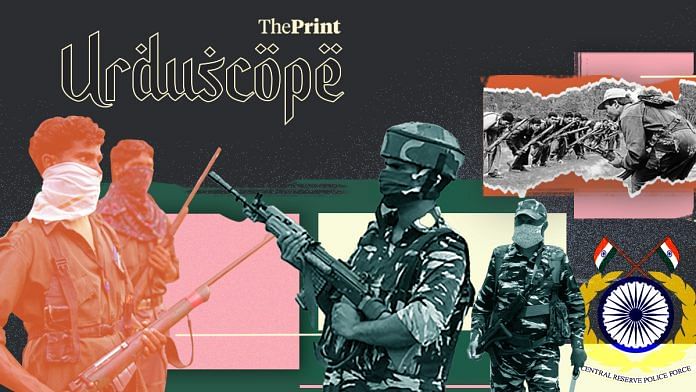New Delhi: Although elections continued to dominate Urdu newspapers this week, the alleged encounter killing of 29 Maoists in Chhattisgarh’s Bastar drew much praise, with one editorial calling it a “commendable step towards peace”.
The editorial in Roznama Rashtriya Sahara on 18 April said India had been grappling with Naxalism for decades and that it was “imperative to eliminate the bloodthirsty Naxalites” operating in states like Bihar, Jharkhand, Chhattisgarh, Madhya Pradesh, and Maharashtra.
“Recently, security forces in Chhattisgarh achieved significant success by eliminating 29 Naxalites, marking a crucial victory. The District Reserve Guard and the Border Security Force conducted the operation, one of the biggest against Naxalites in this decade,” the editorial, titled ‘Revolution doesn’t come from bombs and guns’, said.
Meanwhile, the election frenzy touched a fever pitch, with all three prominent Urdu newspapers — Siasat, Inquilab, and Sahara — dedicating much of their space to the activities in various political camps.
Besides this, editorials also commented on Iran’s missile attack on Israel, urging the two countries to de-escalate tensions.
Also Read: ‘Real unity will only be seen when parties support each other at booth level’ — Urdu press on Oppn
Lok Sabha elections
In its editorial on 19 April, Siasat said that instead of presenting a report on its work in the last 10 years, the BJP and its candidates are trying to “ensnare” the public in “trivial issues”.
“The electoral process has been turned into political mudslinging through derogatory comments. Efforts have been made to diminish the importance of the electoral process by personal remarks. The heinous allegations against opposition leaders have no precedent,” it said.
Meanwhile, important issues such as unemployment remain unaddressed, the editorial said.
“There’s no explanation why the promise of providing 20 million jobs annually made 10 years ago hasn’t been fulfilled. No answer was given about why the previous levels of employment have not been maintained,” it said.
On 19 April — the day of the first phase of voting — Sahara wrote about the pivotal role that young voters play, emphasising how their participation could determine election outcomes.
Inquilab’s editorial that day, meanwhile, focused its attention on the BJP’s election strategy, claiming that while slogans like “Ab ki baar, 400 par” and banners featuring Prime Minister Narendra Modi may give the outward feeling of widespread support for the party, other factors such as Rajput’s protests in Uttar Pradesh and Gujarat could affect results.
The BJP is also worried about the Opposition’s cohesion and alliances in some states, it said.
Siasat’s editorial on 18 April accuses the BJP of leveraging the Ram Temple for electoral gains despite the Election Commission of India’s rules expressly forbidding political parties from using divisive tactics.
Prime Minister Narendra Modi and other BJP leaders frequently highlighted the temple in their campaign speeches, posing questions about the impartiality and effectiveness of the Election Commission, this editorial said, calling on the poll body “to address these concerns directly and ensure that elections focus on public issues rather than religious appeals”.
Sahara’s editorial on 17 April, spoke about using black money in the electoral process, worrying that such a trend raises questions about “electoral integrity” and “undermines” the democratic system.
It did not take any names but said that political parties that “claim to advocate for stabilising the economy by eliminating black money are ironically at the forefront of this practice”.
“First, the origin of such a large influx of black money raises concerns. It’s evident that a significant portion of this black money is generated within our current system, (and is) accumulated and utilised by political leadership during political and electoral processes. Political parties and candidates are using black money to purchase votes, essentially corrupting the process of government formation,” the editorial said.
Siasat’s editorial the same day spoke about the BJP’s challenges in south India, saying that its “excessive focus there indicates that it is losing ground in the north”.
“In the current scenario, it’s essential for the voters of south India to use their vote with utmost prudence and understanding,” the editorial said.
Palestine-Israel
The US veto of Palestinian statehood in the United Nations and Iran’s missile attack on Israel took up significant space in the Urdu press’s front pages and editorials this week.
On 18 April, Inquilab’s editorial said that while neither the Palestinian problem nor the conflict is new, it is the first time that there’s some consensus against Israel’s “illegal occupation”.
“Borders have shifted, prompting people worldwide to understand the Israel-Palestine situation, empathise with Palestinians, and express solidarity. Gazans have received unprecedented support, although it came at a great cost,” it said.
Sahara’s editorial on 16 April had a note of caution for Israel, saying any retaliatory attack against Iran after the latter’s missile strike could escalate into a major conflict in the region.
Despite the two countries being far away, any attack from either side would mean a violation of the airspace of neighboring countries and could escalate the conflict, the editorial said. “It’s imperative for major world powers to play a constructive role in preventing such escalation.”
Inquilab’s editorial that day also focussed on the attack, which it said has “caused widespread anger” in Israel.
“Despite Israel’s perceived invincibility, it has faced two attacks in the last 6-7 months — the Hamas attack on 7 October 2023 and Iran’s more serious attack on 14 April. These (Iran’s) assaults were aimed at minimising civilian casualties, preserving infrastructure, and preventing Israeli retaliation,” it said.
(Edited by Uttara Ramaswamy)
Also Read: BJP ‘wants no competition’, was spooked by AAP-Congress tie-up — Urdu press on Kejriwal arrest



